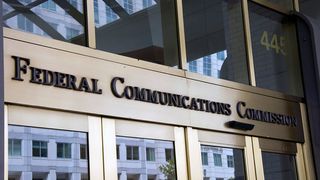Divided FCC Eliminates Main Studio Rule

A politically divided FCC has voted to eliminate the main studio rule. The vote was 3-2 with the two Democrats strongly dissenting.
That was the almost eight-decade old requirement that broadcasters, radio and TV, maintain a main studio in or near their community of license.
The FCC voted unanimously last May to propose eliminating the almost eight decades old rule. FCC Chairman Ajit Pai had said it had become outdated because in the digital age the community has access and can engage with stations via social media or email without having a physical studio nearby.
He also said maintaining a physical address is an expense better put to other uses, like adding more local programming. Broadcasters have said that expense can range from $20,000 a year to several hundred thousand dollars.
Stations are still required to have a local, toll-free telephone number, and to maintain any portion of their public files that is not online at a publicly accessible location within their community of license.
Broadcast attorneys had petitioned the FCC to eliminate the rule, while critics of the move suggested it was one more nod to the Sinclair deal, allowing it, and other broadcasters, to do more remote, national programming rather than local.
The vote in May had been unanimous, but Democrat Mignon Clyburn had concerns that "embracing a world in which automated national programming is the new normal," and said the FCC had to think "long and hard" about eliminating it. At the end of the day, she concluded she could not support the move.
Broadcasting & Cable Newsletter
The smarter way to stay on top of broadcasting and cable industry. Sign up below
"Today is a solemn one, in the history of television and radio broadcasting. By eliminating the main studio rule in its entirety for all broadcast stations — regardless of size or location – the FCC signals that it no longer believes, those awarded a license to use the public airwaves, should have a local presence in their community," She said of her dissent. She also said a toll free number didn't cut it.
Commissioner Michael O'Rielly said they were simply getting rid of an unnecessary and burdensome rule that no longer made sense in a world of social media and the internet. "It does not eliminate localism," he said, adding there wasnot causal connection between the rule and programming localism, though he did say that getting rid of it might lead to more localism by helping smaller stations be more competitive.
That initial vote came when there were only three commissioners, so there were two new voices for the final vote Tuesday (Oct. 24), the returning Jessica Rosenworcel for the Dems and Republican Brendan Carr, a former top Pai aide.
Carr said brick and mortar studios are no longer needed for stations to connect to their communities.
Rosenworcel suggested that broadcasters role as first responders in time of crisis depended on their having a local presence. She said the decision would "hollow out" the unique role broadcasters play, and said it would have been better to have a waiver policy for the rule.
Chairman Ajit Pai asked what "radical corporatist partisan outfit" had joined in the call for eliminating the rule: NPR.
The FCC’s 1998 rule relaxation permitted broadcasters to consolidate facilities. But while that was economical, it also proved a target for anti-consolidation activists.
The FCC initially adopted the in-market requirement to make sure viewers had easy access to their local station and its management. But the commission loosened the rule in 1987 during its Reagan-era broad deregulation of the industry, eliminating a related requirement that a station originated a minimum number of programming hours from such a studio, and further loosened it in 1998, allowing stations still more facilities flexibility.
"The Main Studio Rule is a textbook example of a market entry barrier whose deregulation serves the public interest," said Kim Keenan, president of MMTC. "In practice the Rule drove capital away from multicultural broadcasters who were unable to operate as efficiently as other broadcasters who could house more stations in a single main studio. The Commission has done the right thing by targeting this obsolete rule for repeal."
“Chairman Pai’s singular goal appears to be to ax any and all rules that may be an obstacle to Sinclair’s successful acquisition of Tribune – however contrary it may be to the public interest,” said Sen. Richard Blumenthal (D-Conn.). “Dismantling this key regulation opens the floodgates for a wave of content controlled by consolidated and centralized operations. American communities have witnessed the literally lifesaving value of local content during recent devastating natural disasters. Audiences nationwide stand to lose a great deal with the elimination of the Main Studio Rule.”
“NAB supports elimination of the main studio rule, which has outlived its usefulness in an era of mobile news gathering and multiple content delivery platforms," said National Association of Broadcasters EVP Dennis Wharton. "We're confident that cost savings realized from ending the main studio rule will be reinvested by broadcasters in better programming and modernized equipment to better serve our local communities. We applaud the FCC for continuing to remove unnecessary and outdated broadcast regulations.”
Contributing editor John Eggerton has been an editor and/or writer on media regulation, legislation and policy for over four decades, including covering the FCC, FTC, Congress, the major media trade associations, and the federal courts. In addition to Multichannel News and Broadcasting + Cable, his work has appeared in Radio World, TV Technology, TV Fax, This Week in Consumer Electronics, Variety and the Encyclopedia Britannica.

